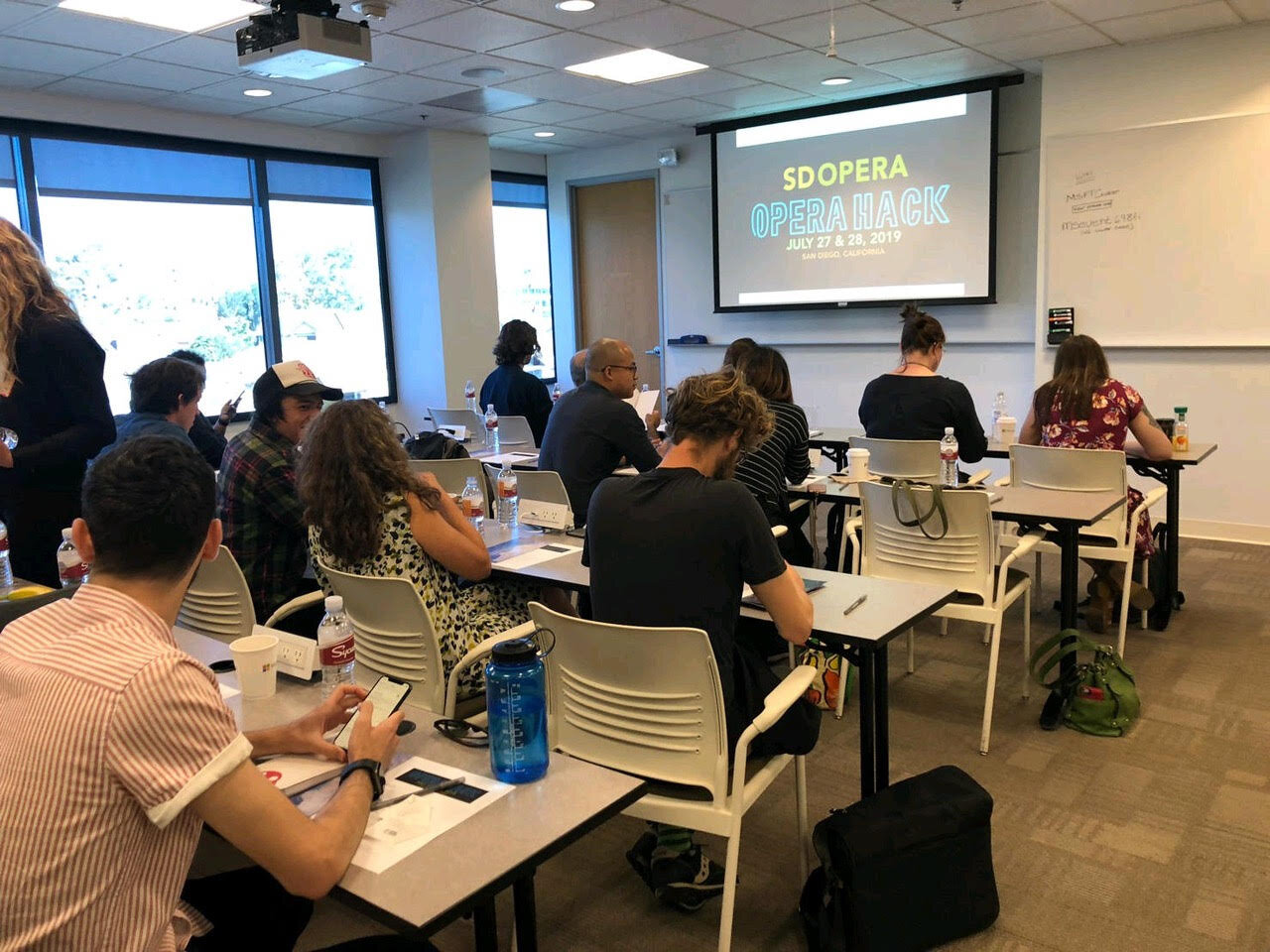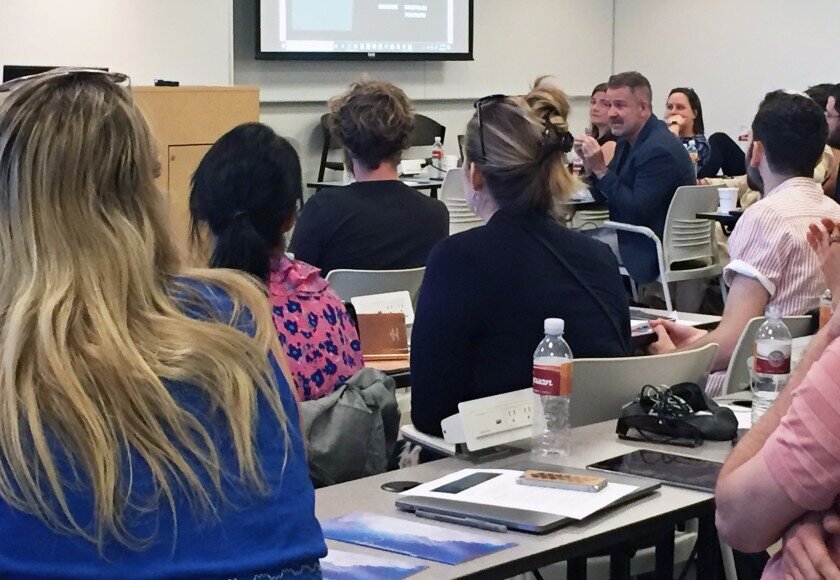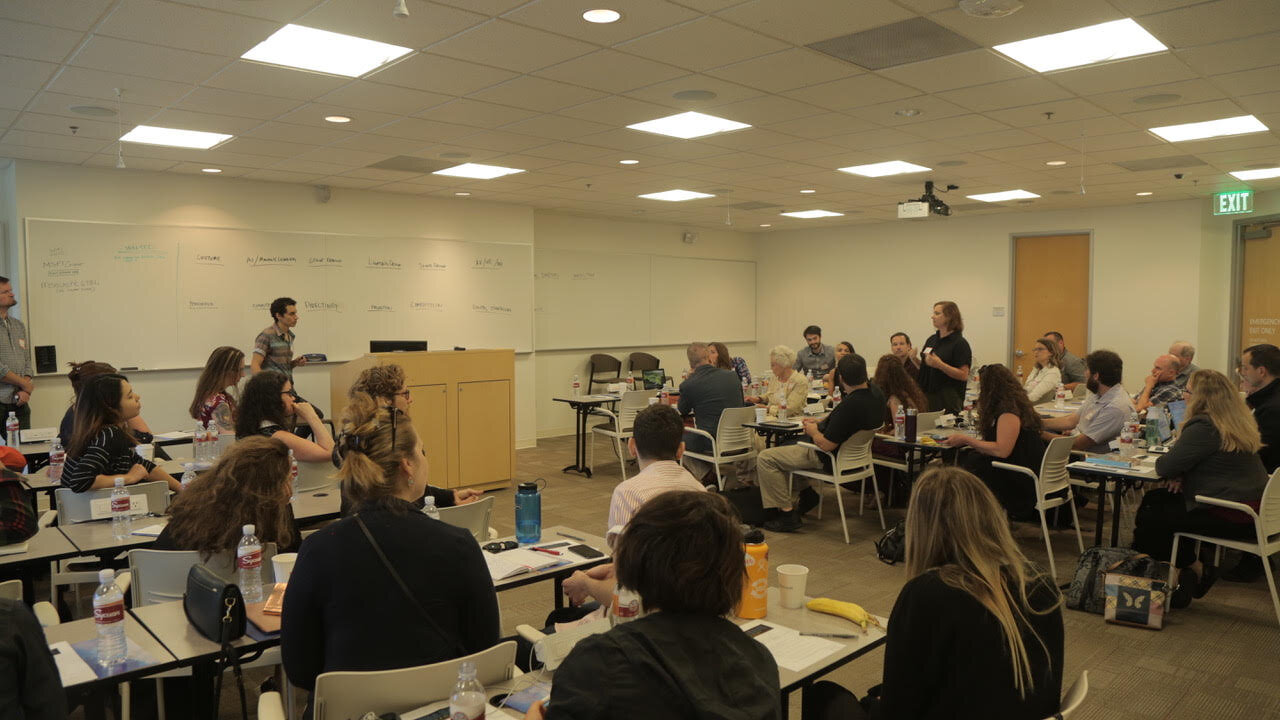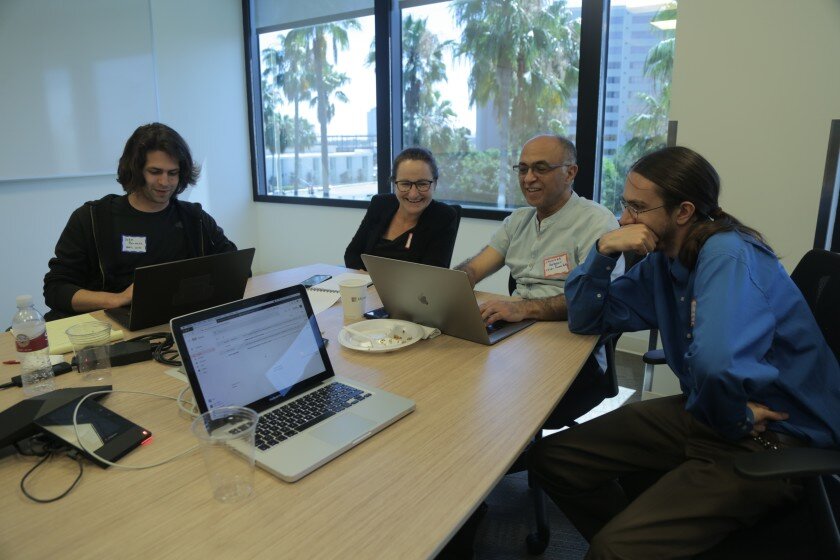The San Diego Opera’s 2019 Opera Hack was held at Microsoft Corporation’s San Diego Offices on July 27-28, 2019. Photo: Angel Mannion
(Santa Fe, NM) - It started when The Santa Fe Opera tweeted about “Opera Hack”. We didn't know about this endeavor, so down the Google rabbit hole we went, followed by an email and phone chat with Opera Hack’s Angel Mannion, who got me up to speed. The top line from Broadway World:
“In July of 2019, San Diego Opera partnered with Microsoft, with support from Opera America and the Ann and Gordon Getty Foundation, to bring together professionals from theater companies, tech companies, and prominent university engineering and theater programs for a two-day hackathon to discover new ways for technology to be used in theater.
Inspired by ‘hacks’ in the technological sector which often brings together experts in disparate fields to work together to solve a presented problem, usually in a limited amount of time, San Diego Opera's Opera Hack partnered participants with local universities and tech companies to come up with creative solutions to scenarios presented by San Diego Opera. Forty multi-disciplinary experts from around North America submitted sixteen proposals to a panel of tech and theater-based advisors.
$40,000 in funding was disbursed to the three winning ideas enabling them to develop their proposal over the course of the year. “
We’re honored to host Angel’s blog below, which details his professional journey at San Diego Opera, from onstage roles to behind the scenes, ultimately arriving at Opera Hack, managing this one-of-a-kind opera industry incubator. JM
By Angel Mannion
(San Diego, CA) -My career with San Diego Opera began in 2011, working as a chorister while pursuing a music degree in college. I was fortunate to sing with the company semi-regularly until 2015, but following SDO’s 2014 season difficulties, I began to understand how the career of a professional musician could be unstable and expanded my horizons, exploring choral conducting and arts project management.
While my heart hasn’t fully recovered from singing in the company’s final production (at that time), I’ve come to realize six years later that I’m a better person and professional from the experience.
Over the course of ten years in classical music, I’ve learned that each season provides new reasons for companies to consider shutting down. While COVID-19 has brought us unprecedented performance challenges, it’s also forced our industry to sit down and acknowledge longstanding problems. If we could turn back time to the pre-pandemic years, wouldn’t it first be worth asking if prior business models were ever that beneficial? It’s common for a major American opera house to spend over $1MM on a production that the public will see and experience only a handful of times. Ticket sales rarely cover more than 25% of those costs, while the other 75% comes primarily from donations, grants, and government funding; this model hasn’t traditionally worked very well for opera.
Now that our operating environment is exponentially more difficult, we have the golden opportunity to entirely deconstruct how opera is defined, produced, and experienced.
The theater industry has already entered a new epoch of public performance. While we can’t control how the economic ripple effects of the pandemic will impact our patrons or government programs, it will take a long time for healthy attendance levels to return. If we can’t rely on performing in local theaters, we’ll need to place a priority on exploring other creative avenues - and venues - that serve our communities, locally and nationally. (Note: San Diego Opera did exactly this with its “La Boheme” performances this weekend at San Diego’s Pechanga Arena parking lot, read the San Diego Union Tribune story).
The most prominent figures in opera are conductors, musicians and composers. However, anyone who works in musical theater knows that the success of any opera is dependent upon the level of skilled labor that powers each production, including stage management, sets, wardrobe, makeup, and everything else that happens behind-the-scenes. High-level production for an opera house (especially a unionized one) is expensive to plan, execute, and maintain. So, (theoretically) the more money a company saves on individual productions, the number of productions will increase. And, hopefully, tickets will become less expensive to purchase.
As the cost of living continues to rise in major cities, younger people will have less financial freedom to choose opera as a new experience. We simply can’t assume or rely upon younger audiences to both become fans and financially support 75% of classical music’s costs as they age and (hopefully) become more affluent. As a proactive measure, it would be more prudent for our industry to immediately embrace and seek new technologies that make opera more accessible, relatable, and affordable to/for younger patrons.
Increasing and optimizing the use of technology in opera will make companies more nimble and competitive in an entertainment market catering to Gen-Y and Millennial consumers.
In order to accomplish this, opera needed both the opportunity and venue for coming together; a way to brainstorm how technology could transform the skilled labor side of opera, making it more efficient, more utilitarian, and more widely understood as public service and an art form unto itself.
Cue Opera Hack. In the Spring of 2017, I was a part of the marketing team for SDO and had heard rumors that David Bennett was hoping to apply for an OPERA America Innovation Grant to fund a collaborative initiative between tech experts and theater artists. This idea immediately resonated because of its community-centric approach, so I volunteered to assist writing the grant application, with the understanding that I’d have the opportunity to lead and manage the project if it was successfully funded.
Happily, OPERA America awarded San Diego Opera a two (2)-year grant in 2018 and Opera Hack was born; I’ve managed the project ever since. Following the award, I recruited a panel of local and national advisors to help create the platform (Matt Witkamp, Dr. Chris Warren, Vita Tzykun, David Adam Moore, Charles Murdock Lucas, Anne E. McMills, Ryan Hunt, and Victoria Robertson).
The mission of Opera Hack is broken down into the following pillars:
COLLABORATE - To be a platform that embraces diversity and solves problems by combining expertise from all backgrounds of theater and technology.
INNOVATE - To discover new methods for technology to be used in the production and presentation of musical theater.
EVOLVE - To promote new ways to make all forms and aspects of theater more exciting, affordable and sustainable.
As previously mentioned, San Diego Opera hosted the first Opera Hack in July 2019, a two-day hackathon at Microsoft’s San Diego corporate office. Forty multi-disciplinary experts from across the US and Canada convened to uncover new ways for technology to be used in theater. This group included representatives from Disney, Google Brain, and Microsoft; administrative leaders from Austin Opera, Houston Grand Opera, and Opera on Tap; as well as graduate engineering and music students from Florida Tech, Yale, Indiana University, University of Buffalo, UC San Diego, and San Diego State University. After submitting a total of 16 proposals to a panel of advisors, $40,000 was awarded to three (3) winning teams - OperaMap, Becoming, and Open Show.
Ashley Tata, a multimedia theater and opera designer and director, uses a virtual reality headset during San Diego Opera’s Opera Hack event July 27-28, 2019 at Microsoft Corporation’s offices in San Diego. Photo via Opera Hack, as printed in a San Diego Union Tribune story by Pam Kragen (August 14, 2019).
On August 26, 2020, OPERA America co-hosted an Opera Hack webinar, showcasing how our three (3) winning teams used their awards for research and development, as well as their results. That webinar may be viewed below.
Opera Hack’s winning ideas were exceptional, as were the equally-impressive thirteen (13) proposals in competition with them, including: wardrobe databasing; an automated winch system as an education tool; a budgeting app for technical directors; a conductor’s baton to automate light cues; a sensory accessibility headset for those with autism; and creative, new suggestions for enjoying opera on-demand at home or at the community level. All proposals are viewable here.
San Diego City Councilmember (District 1) Barbara Bry chatting with an Opera Hack participant. From her July 27, 2019 tweet.
Overall, our first hackathon was considered successful, but our biggest takeaway was that we’d essentially created an event for people to make up their own problems to solve rather than using the expertise in the room to solve the problems that we already had.
We knew that if we had the opportunity to do another Opera Hack, we’d approach it differently and more efficiently. Fortunately, we’re grateful to be doing just that, with assistance of a second OPERA America Two (2)-year Innovation Grant. We’re very excited for the 2021 iteration of our event, which has been redesigned to address our current cultural context and pandemic emergency. Opera Hack 2.0 will:
1) Conduct an industry-wide survey to identify specific, pre-existing challenges facing our industry;
2) Select the Top Ten (10) Challenges and hold an online-based, industry-wide hackathon to discover technological solutions;
3) Award a total of $15,000 USD to three (3) winning solutions selected by our Advisory Panel, and;
4) Provide an online platform to host all submissions so that companies and other interested parties may contact and further develop solutions with respective creators.
Special note: all participants will have rights over their intellectual property and full discretion over the option to share their concepts via our online platform.
Want to get involved? Let’s collaborate!
Opera Hack’s goal is to use technology to create new efficiencies while bringing us closer together as collaborators. To achieve this, we need help from our community to identify problems to solve, recruit participants for our upcoming 2021 hackathon and develop meaningful work partnerships with other companies. Here’s how you can help:
1) Help us identify specific problems to solve together. We hope to uncover new issues that have yet to be exposed or realized. One of the most important elements of Opera Hack 2.0 will be bringing these new problems and challenges to the attention of all. If you work in the industry and have ideas in mind, please email us.
2) Participate in Opera Hack 2.0, Summer 2021. Our open call for hackathon participants will be deployed in early 2021. As of this writing, we haven’t yet announced dates for this one-of-a-kind online experience, but please join our mailing list to receive important updates.
3) Partner and Collaborate with Opera Hack 2.0. San Diego Opera cannot possibly solve all of our industry’s problems and challenges alone - we are but one company. But do you represent an opera organization that supports our mission and wants to get involved? Or are you perhaps a person of influence at a tech company, interested in the opportunity to shape the future of opera and theater?
Simply email us to arrange a phone call - we’d love to discuss how your organization could:
Sponsor Opera Hack research, the development of current Opera Hack proposals as well as new ideas;
Provide resources for Opera Hack participants;
Provide a platform for us to grow our one-of-a-kind community of experts.
We’d also like to encourage everyone in the theater industry to use past and future Opera Hack results as conversation starters with potential corporate sponsors. Once we’ve fully identified upcoming Opera Hack 2.0 problems to address, we’ll begin strategically building new relationships, expanding our Opera Hack business ecosphere.
In closing, I’d like to recognize and thank San Diego Opera General Director David Bennett, SDO’s Director of Institutional Grants Justin Dake, OPERA America’s staff, the Opera Hack advisory panel (as above) and all Opera Hack participants for the open criticism, guidance and community-building they’ve each provided, ensuring that Opera Hack serves not only its mission but a greater purpose. Let’s get to work!
In addition to being Opera Hack’s Project Manager, Angel Mannion splits his time onstage and behind-the-scenes working on community music projects. After studying music at San Diego State University, Angel founded Folklore Guild to bring high school, college, and professional singers together to record music for video game and television soundtracks. Folklore Guild may be heard on Chef's Table (Netflix) and Lamplight City (Grundislav Games). In 2018 and 2020, Angel successfully proposed and acquired two (2) $150,000 OPERA America Innovation Grants (via the Anne and Gordon Getty Foundation), funding San Diego Opera’s Opera Hack project and funding San Diego Opera’s Opera Hack project and securing Microsoft Corporation as a lead sponsor. As a baritone and conductor, Angel frequently performs with professional choirs, symphonies, recording studios, and churches in San Diego and Los Angeles.
Connect with Angel via LinkedIn.
Follow Angel on Instagram.







